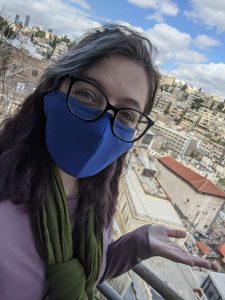Gilman Scholar visits refugees in Jordan

How far across the globe would you go to enrich your college studies? And what steps would you take to learn about people who face crises as part of their everyday lives?
New College third-year Sierra Lamb traveled to Jordan this spring, in the middle of a global pandemic, to do just that.
The recipient of a Benjamin A. Gilman International Scholarship, Lamb is studying international and area studies with a focus on global human rights at New College, and her current experience in Jordan is providing crucial hands-on research for her thesis next year. She arrived in Jordan on February 12 and will leave on May 25.
“I’ve spoken to workers from Zaatari camp (the world’s largest camp for Syrian refugees) and I was able to view some camps closer to Amman (the capital city of Jordan),” said Lamb, who is among few New College students who have been able to study abroad mid-pandemic. “We have focused on both the rights and statuses of refugees in Jordan, as well as the minimum standards to allow refugees to live life with dignity (including health, shelter and sanitation).”
This research is part of Lamb’s work in the School for International Training (SIT) program, “Jordan: Refugees, Health and Humanitarian Action.” The program is focused on the rights and statuses of refugees, as well as the interventions meant to aid them—with a particular interest in health systems in the context of Jordan.
“I wanted to focus my research on the plight of Palestinian refugees in terms of status and rights, and one of my countries of focus is Jordan. Specifically, I’m hoping to analyze the generational impact of this long-term refugee crisis–focusing on things such as access and integration (which, in turn, compose aspects of identity, legal entitlements and community),” Lamb said. “I hope to expand on my knowledge from Jordan and see how another one or two countries are also providing ways of integration yet also allowing people to retain their status as refugees.”
To learn as much as she can while in Jordan, Lamb has visited the Jordanian Hashemite Fund for Human Development (JOHUD) and watched presentations from speakers in the United Nations World Food Programme (WFP) and the International Committee of the Red Cross (ICRC). JOHUD was originally established as an aid organization for Jordanians in need. But, after an influx of Syrian refugees came to Jordan, the organization expanded its operations to include these vulnerable people, Lamb said.
“Their work focuses on access and development, like helping vulnerable communities seek healthcare and rights-based interventions, or providing training to young people to prepare them for work in the field,” Lamb said. “We actually were able to speak with a Syrian woman working on education access for refugee children who struggled financially, and it was amazing to hear about how much she loved her work.”
Lamb also greatly admired the work of the WFP, which provides food assistance to Syrian refugees (through efforts like Healthy Kitchens, which involves Syrian and Jordanian women working together to create snacks and meals for school-aged children).
Living and traveling abroad during a pandemic has not been without its obstacles, however. Lamb has experienced government-ordered curfews and lockdowns, especially during the weekends (which fall on different days than in the United States).
“Friday is like a United States Saturday, and the government issued a lockdown on those days not long after we got to Jordan. Basically, no one is allowed to leave their homes from the curfew time on Thursday night until early Saturday morning,” Lamb said. “This, to me, hasn’t been too much of a difficulty, as it both gives me a chance to hang out with my host family and get homework completed.”
When Lamb is not working, she is exploring Jordan–a country with a long, rich history.
“I could talk about walking eight miles in Petra, which used to be a caravan city, situated between the Red Sea and the Dead Sea, or floating in the Dead Sea, or watching the sunset over Israel in Aqaba,” Lamb said. “However, I think my favorite parts here have been the mundane things. The songs of the petrol trucks and the daily calls to prayer are some things I know I’ll miss back in the U.S.”
Lamb’s experience abroad and among the refugees in Jordan has taught her gratitude, perspective and the power of identity.
“If there is one thing that I have learned in this case, I would say this: identity has power,” Lamb said. “We should take care not to forget it.”
Florence Zamsky, Ph.D., the assistant director of off-campus study/study abroad at New College, encourages students like Lamb to consider such global opportunities. While most study-abroad programs were suspended in Spring 2021, providers constantly assessed local health and safety risks to decide where programs could be run safely, Zamsky said.
“Sierra is studying in Jordan with SIT, a nonprofit organization that specializes in field-based programs, so, throughout the semester, the program had to adapt to constantly evolving local conditions—ranging from political unrest to spikes in COVID-19 cases that prompted a temporary move of the program from Amman to Aqaba,” Zamsky said. “Flexibility and adaptability were definitely key for everyone involved—from program directors to participants.”
Zamsky is thrilled that Lamb has been able to participate in such a transformative experience abroad and hopes others will do the same, especially as travel restrictions ease.
“After months of stay-at-home recommendations and no-travel advisories, it is going to be more important than ever for students to incorporate study abroad in their college career,” Zamsky began, “to enhance their understanding of global issues, experience diverse perspectives and foster cross-cultural understanding and communication.”
Want to study abroad? Contact Zamsky at 941-487-4318 or [email protected].
Yasi Bahmanabadi is an intern in the Office of Communications & Marketing.
